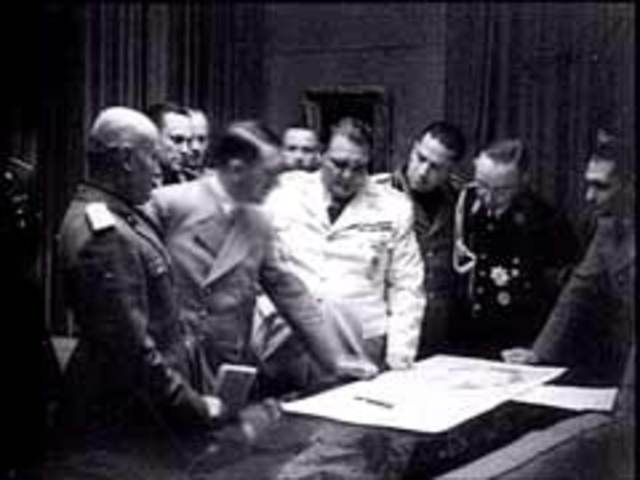

Your browser does not support this video element. National Archives and Records Administration, College Park, MD Czechoslovakia, which was not a party to the Munich negotiations, agreed under significant pressure from Britain and France.īritish prime minister Neville Chamberlain and German chancellor Adolf Hitler greet each other at the Munich conference. The leaders of Britain, France, and Ital y agreed to the German annexation of the Sudetenland in exchange for a pledge of peace from Hitler. Hitler had threatened to unleash a European war unless the Sudetenland, a border area of Czechoslovakia containing an ethnic German majority, was surrendered to Germany. German troops occupy these regions between October 1 and 10, 1938. Concerns among those intimately connected to conflicts in other parts of the world, such as the Sahel or Lebanon, were discussed but officials did not come up with tangible solutions, as they were consumed by the current crisis.Īs the conference is wrapped up, thoughts turn to whether the next time the world’s geopolitical actors and thinkers come together here next year, war will have returned to Europe after decades of peace.September 29–30, 1938: Germany, Italy, Great Britain, and France sign the Munich agreement, by which Czechoslovakia must surrender its border regions and defenses (the so-called Sudeten region) to Nazi Germany. There was a large African presence this year in Munich, partly because the Sahel now represents Germany’s largest and most significant military operation, but also because a number of African leaders were in Europe earlier in the week for the African Union-EU summit in Brussels.ĭespite a strong programme in Munich and the presence of key players from around the world, Ukraine dominated the thinking of Western leaders at the conference. In addition to this morning’s discussions on European security, the Abraham Accords will be a major topic of discussion, with one session including Dr Anwar Gargash, UAE Presidential Adviser, participating remotely Bahraini Deputy Foreign Minister Sheikh Abdullah Bin Ahmed Al Khalifa and Israel’s Minister of Defence Benjamin Gantz both in person. Ukraine crisis dominates discussions at Munich Security Conference It is apt, as in the end it will ultimately be the Europeans who will have to contend with any potential war on their continent. The American delegations have now left Munich, and day three of the summit is largely a European Union affair, with Nato Secretary General Jens Stoltenberg also back in Brussels.

Germany’s legal position on sending weaponry to Ukraine was questioned without clear answers. The support of ‘5000 Helmets’ for Ukraine was mentioned a number of times – including by the Ukrainian President and the mayor of Kiev – in public sessions. (2022) From May 9 to 11, 2022, the Munich Security Conference (MSC) hosted a Munich Leaders Meeting (MLM) in Washington, D.C., that brought together around 80 senior decision-makers and experts from governments, parliaments, armed forces, business, and research institutions from both sides of the Atlantic. And while Germany’s new government said it was ready for the results of sanctions on Russia, the Ukrainians expect more from the European leader. Munich Leaders Meeting in Washington, D.C. He was given assurances of support, especially after the G7 meeting, but was also told clearly that US soldiers would remain outside Ukraine’s borders come what may. In addition to giving a rousing speech at the forum on Saturday, Ukrainian President Volodymyr Zelenskyy met Ms Harris, UK Prime Minister Boris Johnson, German Chancellor Olaf Scholz and a number of other officials. It will also be remembered as the first major in-person global forum after the peak of the Covid-19 pandemic.

The conference was the first security forum to have a female vice president address it, as US Vice President Kamala Harris followed in the footsteps of Mr Biden, who was a regular visitor for years. Russian President Vladimir Putin signs documents recognising two breakaway regions in eastern Ukraine as independent.


 0 kommentar(er)
0 kommentar(er)
